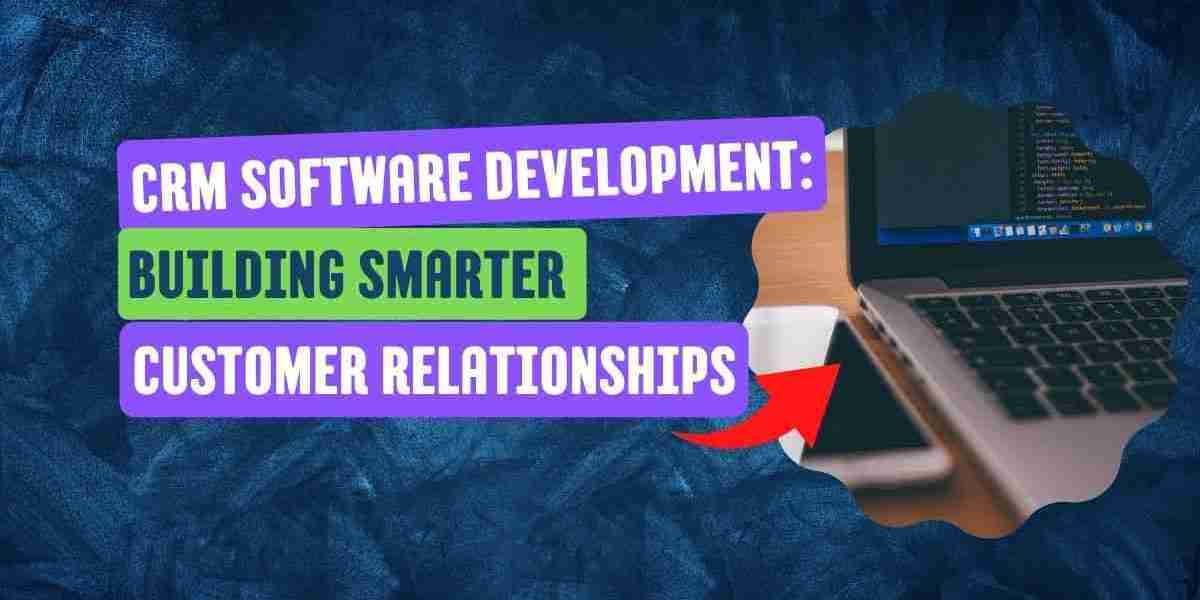In today’s hyper-connected world, customer relationships are the heartbeat of any business. Whether you're a small startup or a global corporation, your ability to manage, nurture, and grow these relationships determines your success. That’s where CRM software development enters the picture.
Instead of relying on clunky spreadsheets or outdated contact books, CRM (Customer Relationship Management) software allows businesses to centralize, automate, and streamline their customer interactions across the board. And when off-the-shelf tools don’t cut it, that’s when CRM software development services become game-changers.
Let’s dive into what it really means to develop a custom CRM, the benefits, the process, and how it can supercharge your business.
What is CRM Software Development?
CRM software development is the process of designing and creating a tailor-made system that helps organizations manage interactions with current and potential customers. Unlike generic CRM tools, custom development ensures the solution aligns with your unique workflows, team structures, and business goals.
Why Businesses Need Custom CRM Software
- One Size Doesn’t Fit All
Most ready-made CRMs offer too much or too little. You either pay for features you’ll never use or lack the flexibility you desperately need. - Streamlined Operations
A custom CRM integrates directly into your existing systems—email, sales tools, marketing platforms—creating a unified ecosystem. - Better Data, Better Decisions
Custom CRMs provide real-time analytics tailored to your KPIs, giving you actionable insights, not just data dumps.
Key Features of a Custom CRM System
- Contact Management
Easily track, store, and manage customer information in one central place. - Sales Pipeline Tracking
Visualize your entire sales journey—from lead capture to deal closure. - Workflow Automation
Automate repetitive tasks like follow-up emails, invoice generation, or lead assignment. - Custom Dashboards & Reporting
Get the metrics that matter to your business without digging through endless filters. - Integration Capabilities
Seamlessly connect with tools like Gmail, Slack, Mailchimp, and accounting software.
Types of CRM Systems You Can Build
- Operational CRM
Focuses on automating marketing, sales, and customer service processes. - Analytical CRM
Helps businesses analyze customer data for smarter decisions and personalized marketing. - Collaborative CRM
Improves communication across departments—sales, support, and marketing—ensuring everyone is on the same page.
Benefits of Custom CRM Software Development Services
- Scalability: Your CRM Software Development grows as your business does. No more outgrowing your tools.
- Cost-Efficiency : Though upfront costs may be higher, long-term savings come from avoiding licensing fees and unneeded features.
- Competitive Advantage: Gain a unique edge with features your competitors don’t have.
- Enhanced Security: Custom CRMs offer data protection features specific to your needs, unlike cookie-cutter platforms.
The CRM Software Development Process
- Discovery & Planning: Understanding your business needs, current challenges, and end goals.
- Design & Prototyping: Creating mockups and user flows to ensure intuitive navigation.
- Development & Integration: Building the backend logic, UI, and integrating third-party tools.
- Testing & QA: Extensive testing to catch bugs, usability issues, and performance bottlenecks.
- Deployment & Training: Launching the system and training your team to ensure a smooth transition.
- Maintenance & Support: Ongoing support to upgrade features and handle any issues.
Custom CRM vs. Off-the-Shelf CRM: A Quick Comparison
| Feature | Custom CRM | Off-the-Shelf CRM |
|---|---|---|
| Flexibility | ✅ High | ❌ Limited |
| Integration | ✅ Tailored | ❌ Predefined |
| Cost | ? Higher initial, lower long-term | ? Recurring fees |
| Features | ? Exact match | ? Generic bundles |
| Scalability | ? Easy to scale | ? Limited |
Industries That Can Benefit from CRM Software Development
- Healthcare: Patient management, appointment scheduling, and medical history.
- Real Estate: Property listings, lead tracking, and contract management.
- E-commerce: Customer behavior analysis and personalized promotions.
- Education: Student performance, course tracking, and communication.
- Finance: Secure client communication, document handling, and reporting.
How to Choose the Right CRM Development Partner
- Check Experience & Portfolio: Look for industry-specific expertise.
- Assess Communication: You’ll be working closely—ensure they get your vision.
- Evaluate Post-Launch Support: Will they be there after deployment?
- Ask for Customization Flexibility: The more adaptable, the better.
Common Mistakes to Avoid in CRM Development
- Ignoring user feedback
- Overcomplicating the interface
- Skipping scalability planning
- Poor data migration strategy
- Lack of ongoing support
Trends in CRM Software Development for 2025 and Beyond
- 1. AI-Powered Insights
- Machine learning is helping predict customer behavior and suggest next-best actions.
- 2. Voice-Activated CRM
- Think Siri or Alexa, but for your sales pipeline.
- 3. Hyper-Personalization
- Custom CRMs will offer customer experiences tailored down to individual preferences.
- 4. Mobile-First Development
- Teams on the go need CRM access anytime, anywhere.
- 5. Data Privacy & Compliance
- With regulations like GDPR, CRMs must be more transparent and secure.
Conclusion: Your Customers Deserve Better
Let’s face it—relationships drive revenue. And your customers? They expect personalization, quick responses, and seamless experiences. A custom CRM does more than store contacts; it becomes the central brain of your business strategy.
By investing in CRM software development, you’re not just buying software—you’re investing in your company’s growth, your team's productivity, and your customer’s satisfaction.
So if you're ready to streamline your sales, supercharge your support, and wow your customers, it’s time to build the CRM your business truly deserves.
FAQs
1. How long does it take to develop a custom CRM?
It depends on the complexity, but typically between 3 to 6 months for a full-featured system.
2. Is custom CRM better than SaaS CRM tools?
If your needs are highly specific or you want more control, then yes—custom CRM is usually the better long-term investment.
3. Can I migrate data from my old CRM?
Absolutely. Developers can migrate existing data to your new system without losing history.
4. Is mobile CRM development possible?
Yes! Mobile responsiveness or a dedicated CRM app can be included in your custom development.
5. What’s the cost of CRM software development?
Prices vary widely—from $10,000 to $100,000+—depending on features, integrations, and complexity.




